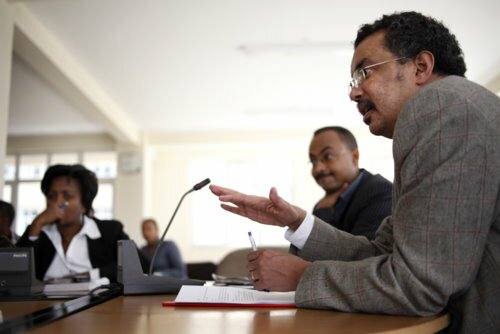Voices on Ownership: Tedros Adhanom Ghebreyesus.
 Minister Tedros Adhanom Ghebreyesus Photo Credit Dominic Chavez |
This is the second of a series of perspective pieces on country ownership from the “Advancing Country Ownership for Greater Results” roundtable organized last week by the Ministerial Leadership Initiative for Global Health (MLI), a program of Aspen Global Health and Development. This high-level dialogue included senior officials from developing countries, the US government, development partners and NGOs. These stories will run every day this week.
The second of four pieces covers the perspective of Ethiopia Minister of Health Tedros Adhanom Ghebreyesus.
Minister Tedros said for many years he has been pushing for more country ownership. His approach is consistent: One vision, one set of priorities, and one group -- donors, partners and countries – working together.
“When donors enter into a discussion with developing countries, they need to enter the conversation with a sense of respect for country priorities,” Tedros told the group last Thursday. “When things don’t mesh, donors should reconsider…and build on the priorities of the developing countries.”
Tedros said that the conversation wasn’t just with donor countries, but with foundations and non-profit groups. He cited the example of MLI’s support of Ethiopia’s proposal to build a new management system called Balanced Scorecard. “We said, ‘Our priority is Balanced Scorecard,’ and after negotiations, they accepted that. If it’s what the country needs, then that would ensure commitment and get results.”
He said that while aid in general can have a big impact on a country’s health programs, “if the aid can go through the country system, it can be even more impactful. Not only will aid be based on a clear strategy, but it also should use the country system. If the country system has problems, you shouldn’t abandon it; we should fix it and use it.”
The imbalance in the power relationship between donor and recipient country, Tedros said, creates inherent difficulties.
“The donor should recognize that it’s the right of developing countries to plan and set their own priorities,” he said. “The one who has the power – the one who has the money – should recognize the rights of the recipient. If the donors don’t recognize the right, it will be very difficult for the donors to give the power and responsibility to the recipient.”
If donors don’t support country ownership, he said, damage begins. “It means creating a parallel structure, it means weakening the country structure. Even if you get results from a parallel structure, you may not sustain it. Donors should understand all the consequences.”
Tedros then addressed the issue of corruption, and how donors and recipient countries can deal with the issue.
“Trust can be built,” he said. “Developing countries should be very, very honest in really fighting corruption and trying to eliminate corruption. They have to build institutions to fight corruption. Corruption could even kill a country. It’s not just an issue for donors. Corruption is a serious killer. If the donors can recognize the commitments of the country to this extent, then we can build a system.”
The motivation to fight corruption in developing countries should first come from building a better functioning health system, he said, not to please donors.
“Developing countries should be doing it for themselves,” Tedros said. “Fighting corruption is for the survival of the country. … All fiscal procedures should be really transparent and donors can really build confidence.”
Tedros also said that aid to poor countries wasn’t just a handout. It was part of all countries trying to save lives, no matter where people lived.
“Aid is not charity,” Tedros said. “It is an investment for the betterment of our world.”
Other posts from Voices on Ownership
Minister Tedros Adhanom Ghebreyesus
Wisman on MLI: Skepticism faded, trust grew
Keyword Search
MLI works with ministries of health to advance country ownership and leadership. This blog covers issues affecting the ministries and the people they serve.
Connect with Us
![]()
![]()
Categories
Blogs We Like
- Africa Can End Poverty
- Africa Governance Initiative
- Behind the Numbers
- CapacityPlus
- Center for Global Health R&D Policy Assessment
- Center for Global Development: Global Health Policy
- Center for Health Market Innovations
- Global Health
- Global Health Hub
- Global Health Impact
- The New Security Beat
- PAI Blog
- RH Reality Check
- Save the Children
- Transparency and Accountability Program
Contact Us
Please direct all inquiries to
